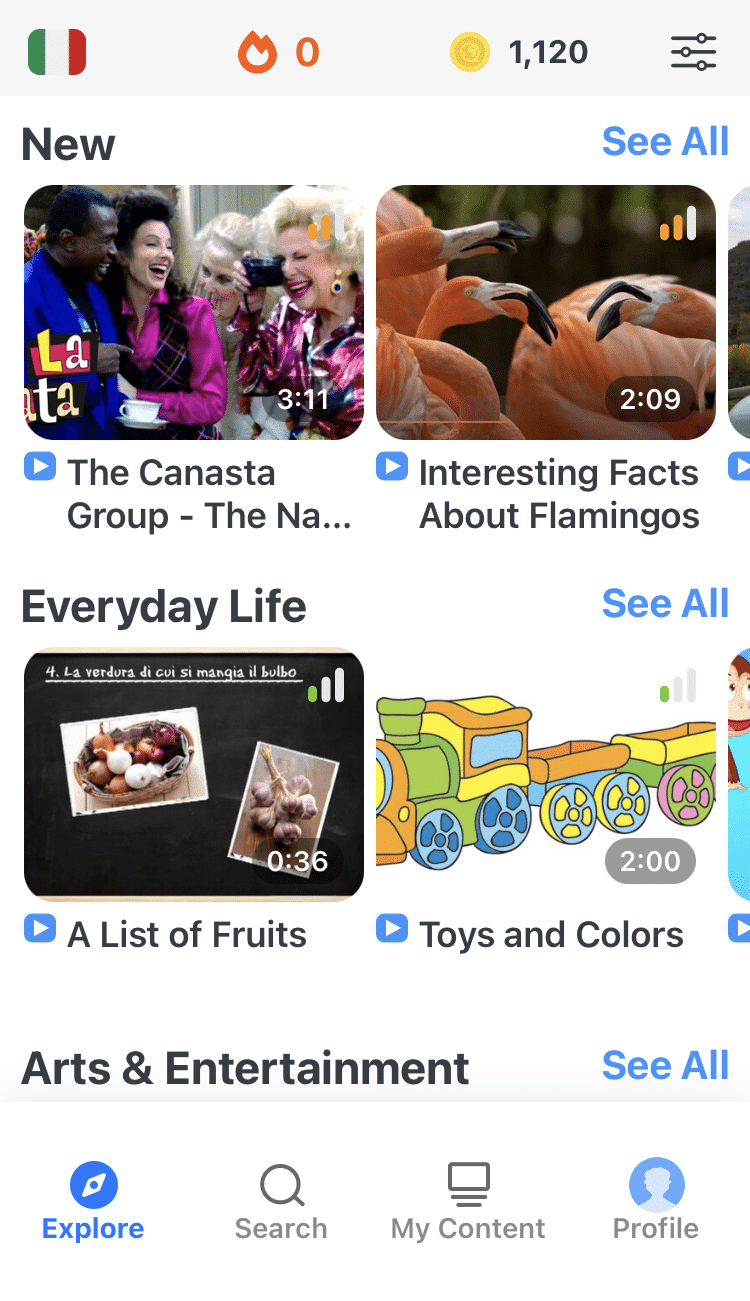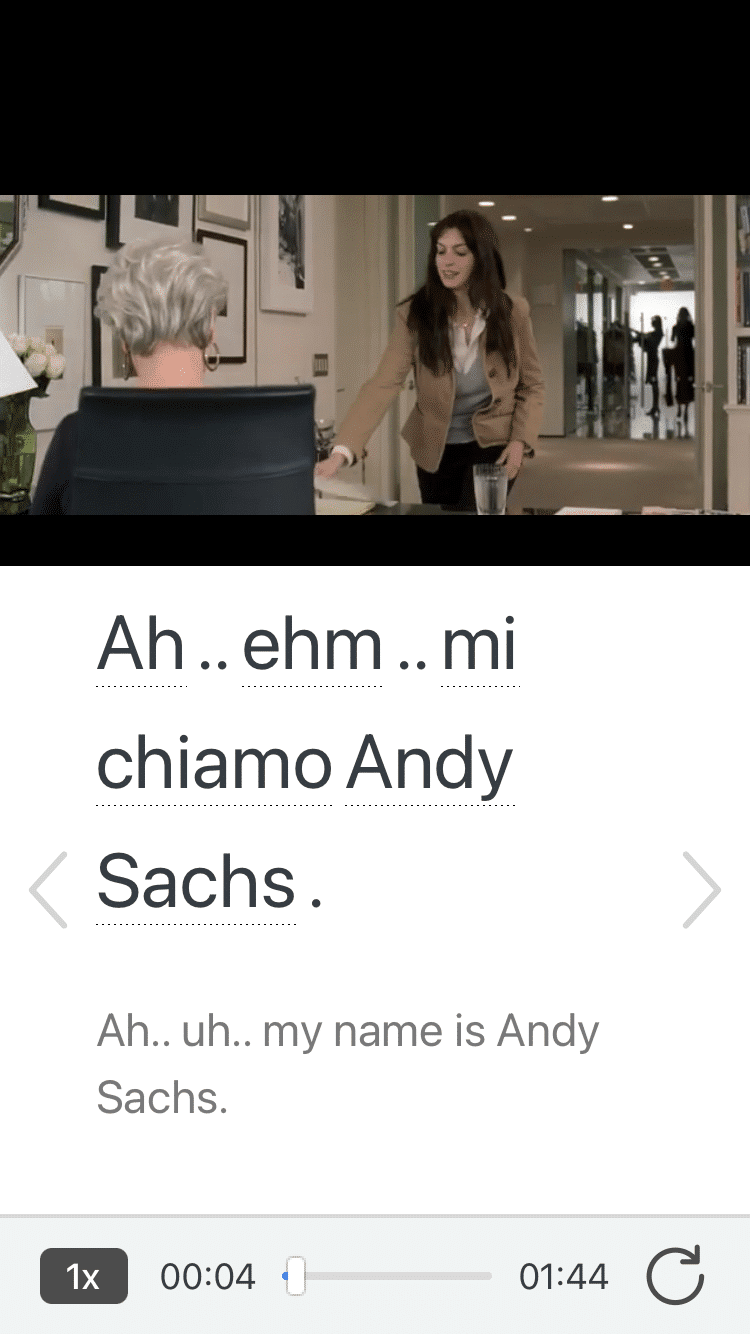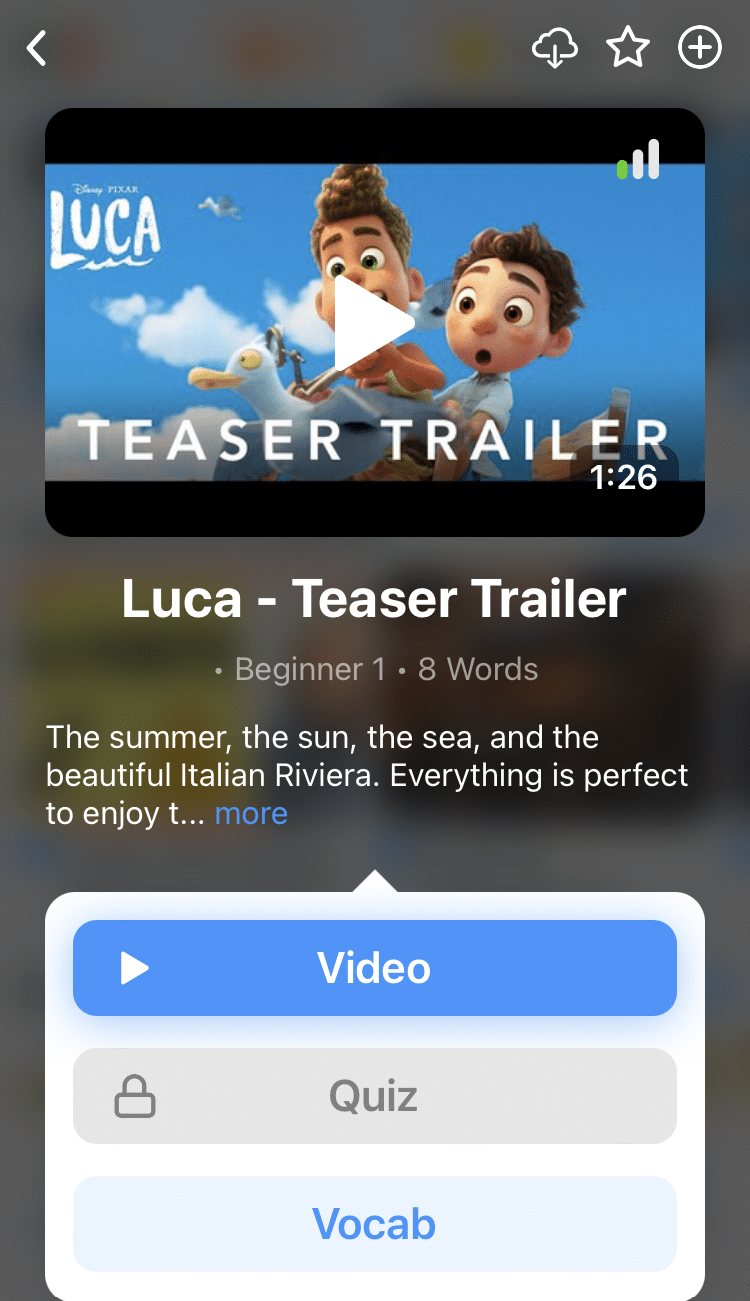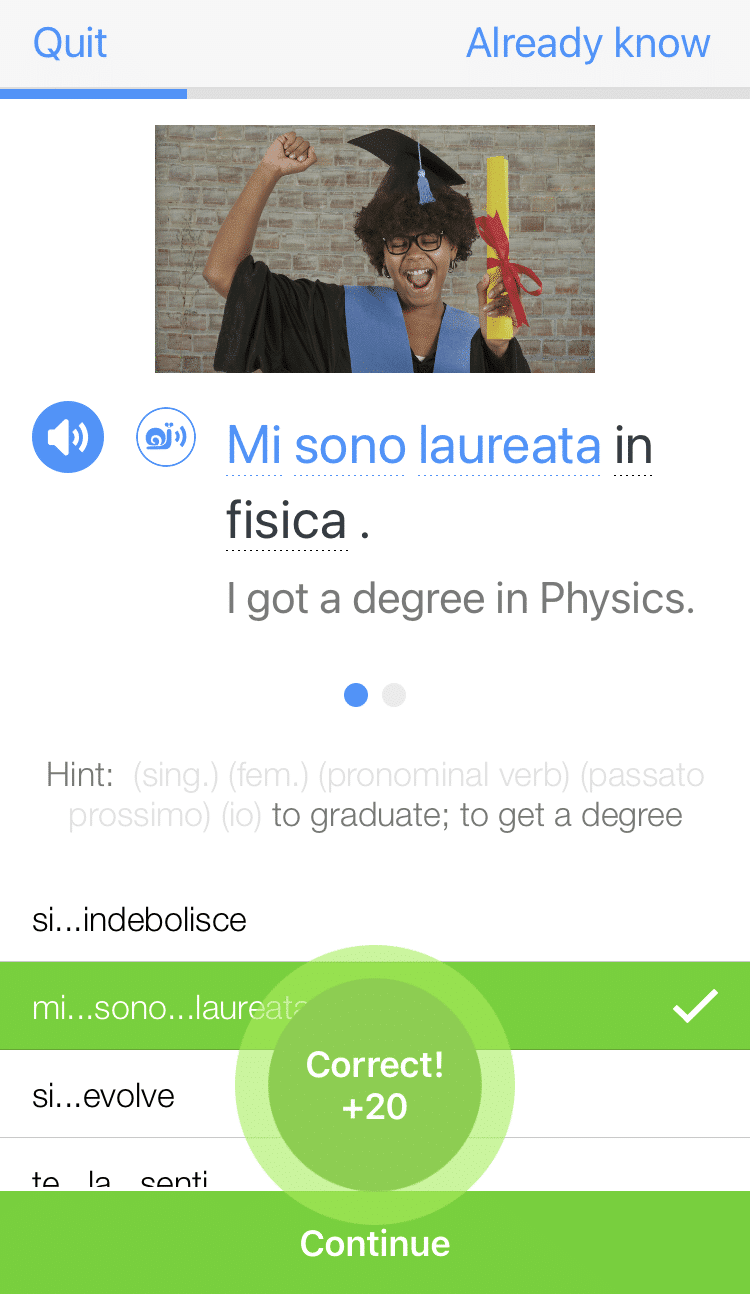
50 Common Italian Synonyms
“Che fai tu, luna, in ciel, dimmi, che fai, silenziosa luna?” (“What are you doing, moon, in the sky, tell me, what are you doing, silent moon?”) — Giacomo Leopardi
The great Italian philosopher and poet Leopardi had deep thoughts when he gazed at the moon. Notice, though, that he didn’t actually describe it.
Maybe he just couldn’t settle on the right words. Is the moon rotonda (round)? Tonda (round)? Perhaps it’s piena (full)? Or intera (full/whole)?
There are so many choices when it comes to describing things. A synonym gives us the ability to say the same thing in many different ways.
In this post, I’ll teach you 50 Italian synonyms that you can use to expand your vocabulary!
Contents
- What Are Synonyms and Why Are They Important?
- 50 Italian Synonyms to Round Out Your Vocabulary
- Sottovoce | Piano (in a low voice)
- Lentamente | Piano | Adagio (slowly)
- Velocemente | In fretta (quickly)
- Forte | Rumoroso (loud, noisy)
- Grande | Grosso (big)
- Piccolo | Minuscolo (tiny, small)
- Molto | Tanto (much)
- Stesso | Uguale (alike)
- Differente | Diverso (different)
- Vecchio | Anziano (old [age])
- Vecchio | Antico (old [item])
- Grasso | Paffuto (fat)
- Magro | Sottile (thin)
- Monotono | Noioso (dull, monotonous)
- Simpatico | Carino | Buono (nice)
- Solamente | Unicamente (only)
- Spasso | Divertimento (fun, enjoyment, pleasurable activity)
- Povero | Sfortunato (poor, unfortunate, wretched)
- Propizio | Fortunato (fortunate, lucky)
- Vicino | Prossimo (near)
- Lontano | Distante (far)
- Adesso | Ora (now)
- Subito | Immediatamente (immediately)
- Più tardi | Dopo (later)
- How to Learn Italian Synonyms
- And One More Thing...
Download: This blog post is available as a convenient and portable PDF that you can take anywhere. Click here to get a copy. (Download)
What Are Synonyms and Why Are They Important?
What, exactly, are synonyms? Synonyms are words that have the same, or almost the same definition. If you substitute a word in a sentence with its synonym, the meaning of the sentence won’t change.
It’s saying one thing in two different ways.
Although the general meaning remains the same, it’s important to note that sometimes there are subtle nuances in a word’s meaning which can slightly change the tone of the sentence.
Think, for example, of the difference between calling someone “plump,” “chunky,” “fat” or “meaty.” Phew, those just get worse and worse! They all mean the same… but the slight difference can make or break a friendship.
Learning words in groups is a good idea to help you remember them, and grouping words with similar definitions can help you find a common thread between them.
Not only will learning synonyms help you expand your Italian vocabulary, but it’ll also help you be more precise when using the language.
50 Italian Synonyms to Round Out Your Vocabulary
Sottovoce | Piano (in a low voice)
Both words mean “to speak quietly” but sometimes sottovoce can also indicate that a person is whispering. (The actual word for whispering is sussurro .)
Lentamente | Piano | Adagio (slowly)
In Italian, all of these words mean “slowly”:
Cammini lentamente. (You walk slowly.)
Parla piano, per favore. (Speak slowly, please.)
Cercate di camminare adagio. (Try to walk slowly.)
It’s worth noting, however, that you’re most likely to hear lentamente and piano used to say “slowly” in the majority of everyday conversations.
Adagio can also be used with the meaning of doing something slowly and carefully:
Cammina adagio, il pavimento è bagnato. (Walk slowly and carefully, the floor is wet.)
Velocemente | In fretta (quickly)
Often, when we say that something or someone is moving at a fast pace, we choose the word rapidamente (quickly, fast) but here are two other ways to say a person or thing is zooming by.
Additionally, you can use fretta to encourage someone to move quickly.
For instance, if you spot the bus coming down the street when your companion is browsing the shop windows in the distance, it’s okay to call, “Fai in fretta!” or “Affrettati” (“Hurry!”).
Forte | Rumoroso (loud, noisy)
Most of the time, forte is used to describe someone who’s strong.
But forte can also mean “loud.” (If you’re a musician, you probably already know this.)
Grande | Grosso (big)
While grande and grosso can both be used to say “big,” there are some slight differences that you should be aware of.
Grande is often used to describe someone as “tall” or “muscular.”
Il mio amico è un uomo grande. (My friend is a big/tall man.)
Grosso, on the other hand, can mean “fat” or “thick.”
Ho comprato un grosso libro di testo. (I bought a big/thick textbook.)
Piccolo | Minuscolo (tiny, small)
Piccolo means tiny; minuscolo also means “tiny”—as well as “very tiny!”
Molto | Tanto (much)
Molto and tanto both convey quantity. Sometimes tanto goes beyond “much” to mean “too much” but the difference is subtle.
Stesso | Uguale (alike)
Uguale refers to the identical nature of things. That is, it often shows that people or places haven’t changed, that they’re alike in the sense that they remain the same as they once were.
Differente | Diverso (different)
Both differente and diverso are used to say “different” in Italian.
Vecchio | Anziano (old [age])
Vecchio can be used to reference age so it’s possible to exchange it for the synonym anziano. They both reference age although anziano is used more often than vecchio.
When referring to a person, vecchio can sound rude unless said as a joke, so it’s best to use anziano to avoid offending anyone. For example:
Il mio vicino è anziano. (My neighbor is old.)
Vecchio | Antico (old [item])
Vecchio and antico both mean “old” and refer to objects. For instance:
Il tavolo è vecchio. (The table is very old.)
Il tavolo è antico. (The table is antique.)
There’s a level of extended age that’s implied by using antico although both words can be used to state that an item is just very old.
Grasso | Paffuto (fat)
Grasso and paffuto both mean “fat” in Italian.
In terms of their usage, paffuto is considered a more informal and kinder term than grasso and is often used by those who want to avoid being rude by describing someone as grasso/grassa.
Magro | Sottile (thin)
Both magro and sottile mean “thin.”
Use magro to refer to people and sottile to reference items.
Monotono | Noioso (dull, monotonous)
While these words are very similar and can be translated as “dull,” it’s important to be aware of a difference in how they are used:
In Italian, the word monotono means “monotonous,” as in something that is repetitive, often used negatively.
Noioso is used in a similar way to the word “boring” in English. Describing something as noioso doesn’t necessarily mean that it’s repetitive, but that it’s not very entertaining.
Simpatico | Carino | Buono (nice)
Italian is the language of love; is it any surprise that there are so many synonyms for the word “nice?”
Simpatico and carino are both used to refer to something nice or pleasant. They show that someone or something is pleasing to the senses.
Buono also means “nice” but it additionally indicates that something is good or okay.
It’s especially useful when describing food:
La pizza ha un sapore molto buono. (The pizza tastes very good.)
Solamente | Unicamente (only)
Both of these terms are often used interchangeably to say “only” in Italian.
While both are acceptable, unicamente is considered slightly more formal than solamente.
Spasso | Divertimento (fun, enjoyment, pleasurable activity)
Spasso is usually used more frequently in casual conversations to mean “fun.”
Che spasso al matrimonio a Roma! (We had a lot of fun at the wedding in Rome. [Lit. “What a fun at the wedding in Rome!”])
Divertimento is often considered more formal and can refer to types of fun or entertainment.
L’estate è sempre piena di divertimento! C’è così tanto da fare! (Summer is always full of entertainment! There’s so much to do!)
Povero | Sfortunato (poor, unfortunate, wretched)
Povero and sfortunato can be used to indicate someone who’s really down on their luck or in an unfortunate situation.
While povero literally means “poor” and sfortunato literally means “unfortunate,” both imply a certain degree of wretchedness.
Propizio | Fortunato (fortunate, lucky)
Italians love buona fortuna! (good luck!) so it’s not shocking to see that they use more than one word to express good fortune.
A cultural side note: In bocca al lupo (literally: in the mouth of the wolf) is a common term to wish someone good luck!
Vicino | Prossimo (near)
Sometimes, prossimo is used to mean “next,” but both vicino and prossimo indicate location.
Even using prossimo to say “next” shows that whoever’s next is very near the beginning of the line!
Lontano | Distante (far)
Lontano is used to refer to distance in a more general way.
L’aeroporto è lontano da qui. (The airport is far from here.)
Distante, on the other hand, often refers to a specific distance.
L’aeroporto è distante 75 chilometri da qui. (The airport is 75 kilometers away from here.)
Adesso | Ora (now)
Both adesso and ora mean “now” in Italian.
Depending on where you are in Italy, you might hear one used more frequently than the other.
Subito | Immediatamente (immediately)
Subito and immediatamente are both used to say “immediately” in Italian.
However, you’ll hear subito used more often in everyday Italian conversations and less formal situations.
Più tardi | Dopo (later)
Both più tardi and dopo suggest that something will occur later.
Dopo and prossimo share that unique Italian usage of inferring that someone or something is next in line to do something.
How to Learn Italian Synonyms
If the list above has you hungry (or starving or famished) for more synonyms, here are some suggestions for how to learn them:
- Grab a thesaurus to find similar word groups. Look up any common word to find a more intriguing one! One useful resource is the Italian Dictionary & Thesaurus app (available for iPhone and Android users).
- It’s also useful to hear how they’re used in context by native Italian speakers. For example, you could look out for synonyms in Italian movies, or you could try searching for them on FluentU.
FluentU takes authentic videos—like music videos, movie trailers, news and inspiring talks—and turns them into personalized language learning lessons.
You can try FluentU for free for 2 weeks. Check out the website or download the iOS app or Android app.
P.S. Click here to take advantage of our current sale! (Expires at the end of this month.)
Synonyms open up so many options and enhance communication skills. They’re invaluable for adding flair to writing and depth to conversations.
Call it la luna piena (the full moon) or la luna intera (the full moon) but however you say it, show that moon in all its glory!
So use synonyms to grow your vocabulary—and reach for the Italian moon!
Buona fortuna! (Good luck!)
Download: This blog post is available as a convenient and portable PDF that you can take anywhere. Click here to get a copy. (Download)
And One More Thing...
If you're as busy as most of us, you don't always have time for lengthy language lessons. The solution? FluentU!
Learn Italian with funny commericals, documentary excerpts and web series, as you can see here:

FluentU helps you get comfortable with everyday Italian by combining all the benefits of complete immersion and native-level conversations with interactive subtitles. Tap on any word to instantly see an image, in-context definition, example sentences and other videos in which the word is used.

Access a complete interactive transcript of every video under the Dialogue tab, and review words and phrases with convenient audio clips under Vocab.

Once you've watched a video, you can use FluentU's quizzes to actively practice all the vocabulary in that video. Swipe left or right to see more examples of the word you’re on.

FluentU will even keep track of all the Italian words you’re learning, and give you extra practice with difficult words. Plus, it'll tell you exactly when it's time for review. Now that's a 100% personalized experience!
The best part? You can try FluentU for free with a trial.
Start using the FluentU website on your computer or tablet or, better yet, download the FluentU app from the iTunes or Google Play store. Click here to take advantage of our current sale! (Expires at the end of this month.)



